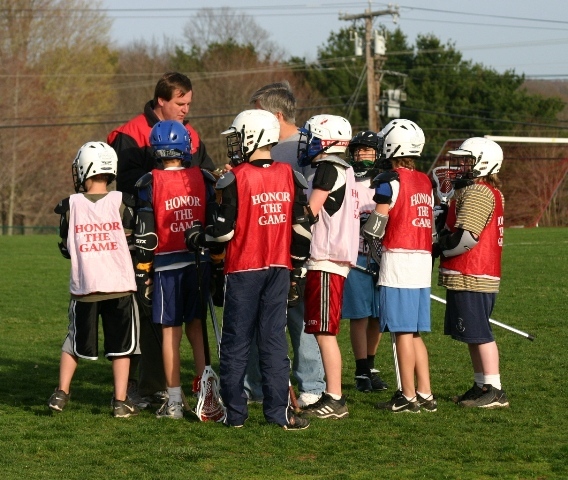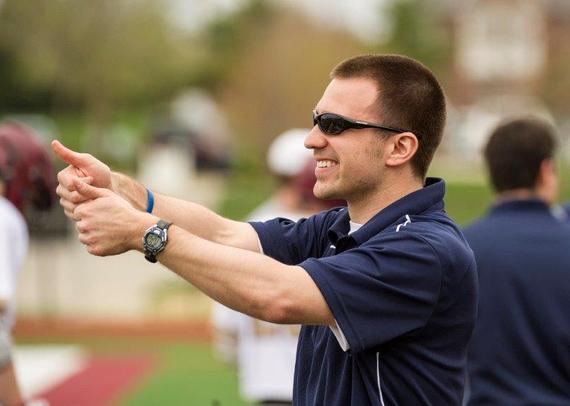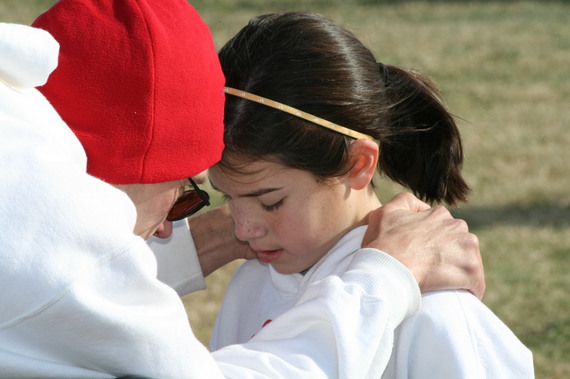I just became a soccer mom, and so far I think it's going pretty well.
You won't find me yelling from the bleachers, "helpfully" directing every move my son makes. I'm not harassing the coach about more play time for my little buttercup. Instruct other players besides my own? Get myself worked up in a frenzy if we're losing? No way. My sense of self worth isn't tied to the performance of my young athlete, and my ego doesn't rise or fall according to the scoreboard.
Of course, my son is only 3. During games he wanders off the field to follow butterflies. His teammates are mostly interested in the snacks. Goal -- what goal? This is a confused herd of munchkins who just stumble around being adorable. Parents chuckle, the coach is reassuring, there's not an ounce of pressure in the air.
Tick-tock. Any minute this all changes. The sports scene stops being lighthearted and starts being infuriating.
This is what I have to look forward to: a youth sports culture so dysfunctional that it fuels a near-deadly kettlebell attack on a college football coach by a famous helicopter parent. The parent in question, Diddy, has been charged with three counts of assault with a deadly weapon, one count of battery and one count of making terrorist threats.
Terrorist threats? What world are we living in where ISIS is sitting on the sidelines of our kids' games?
Somewhere along the way, adults began applying the same win-at-all-costs mentality of professional sports to games played by their first-graders. The serious business of winning now starts at the youngest of ages. Whether the experience is fun for kids is irrelevant.
Parents these days not only want the best for their kids, they want their kids to be the best. Immediately.
That means a hyper-competitive environment where children are expected to specialize in a sport as close to infancy as possible. You'd better train with private coaches in between practices, too. Oh, and sign on to travel teams that push families -- and their bank accounts -- to the limit with far-flung practices and games.
Even parents who hate what this all represents don't feel like they have a choice. If they want their kids to play sports, they have to adapt to this stressful culture of winsanity to keep up.
A friend of mine has a son who's participating in "pre-team" gymnastics training twice a week for three hours a pop, all in the hopes of making it to a team. He's 6.
Another friend recalled how her 10-year-old son's little league baseball team lost a playoff game that ended their season. Afterwards, the players sat silently in the dugout, as if the game was their jobs and they'd been fired. The coach acted like someone had died. There was nothing to be hopeful or proud about, nothing to look forward to, nothing to learn from the experience.
Who created this rule that kids can't be happy if they don't win? How can this pressure-cooker experience possibly be fun?
The answer is: it's not. Which is why 70 percent of children drop out of sports by the time they're 13.
Having fun is the reason that over 90 percent of kids participate in sports, according to a study by George Washington University. But when it comes to defining what "fun" is, winning doesn't rank highly for children. It's actually 48th on the list.
The top criteria of what kids define as "fun" in sports are: trying your best, being treated with respect by the coach and getting playing time.
When young people leave sports because of a downward spiral of negativity, they're deprived of all the physical, social and emotional benefits that sports can offer, including self confidence, resilience, mental toughness, teamwork, self control and respect for others.
Jim Thompson, Founder and CEO of the Positive Coaching Alliance, recognized the crisis in youth sports years ago and made it his life's mission to revolutionize this industry. Over the past 17 years, PCA has been steadily transforming the world of youth sports, pursuing a mission of "Better Athletes, Better People" by working to provide all youth and high school athletes with a positive, character-building youth sports experience.
 For PCA, winning to be competitive isn't a bad thing. The problem is the win-at-all-costs mentality that's endemic to what Thompson calls the entertainment sports culture.
For PCA, winning to be competitive isn't a bad thing. The problem is the win-at-all-costs mentality that's endemic to what Thompson calls the entertainment sports culture.
"Culture determines a lot about how we behave," he notes. "Without even realizing it, we dance to the culture of organizations that we want to be a part of."
PCA teaches coaches and parents how to change the culture of teams by scrapping the negativity that pummels the self-esteem and spirit of youth athletes and leads them to drop out. Instead, PCA-trained coaches collaborate with parents to build a positive environment that gets kids to buy in, work hard, support each other and go into an upward spiral. The approach is not only beneficial to the emotional health and development of kids, it also leads to more victorious teams.
This isn't just feel-good pabulum. The positive coaching movement is backed by data-driven research from the best minds in sports and academia, starting with Thompson's own background in behavioral psychology and organizational culture.
One study co-authored by an academic advisor to PCA concluded that among other benefits, a positive sporting environment can predict the psychological well-being of kids and help them deal with a range of good and bad emotions in life. This includes experiencing fewer instances of depression.
PCA's recipe for total success is what has the attention and respect of the entire sports world. The organization is embraced by a who's who of sports royalty, from brand name partners like Major League Baseball, to a star-studded advisory board led by NBA coaching legend Phil Jackson, to a distinguished national network of PCA trainers, board of directors and thought leaders in sports and psychology. 
PCA identifies three key effects of a positive coaching experience: 1) Players feel valued; 2) Players feel respected; and 3) Players believe that their coach believes in them.
These qualities are exactly what I've seen in motion with the Jersey Hammerheads, a competitive swim team whose journey from underdogs to champions is captured in a documentary I'm producing.
The swimmers on this team happen to be autistic. According to Thompson, that makes the potential benefits of positive coaching even more dramatic, an outcome he experienced firsthand when he included athletes with Down Syndrome in a community basketball league he created.
The Hammerheads coach, Mike McQuay, leads the team with a persistent optimism, setting high expectations despite the swimmers' disabilities. McQuay not only believes in his athletes' promise in the pool, he's one of the only people besides their parents to ever believe in them period.
Over the course of the six months that we filmed the Jersey Hammerheads come together as a team and begin to compete, the athletes gained life-changing confidence, while their parents gained newfound hope for the futures of their marginalized children.
Not coincidentally, positive coaching also led the Hammerheads to win state and national level competitions.
"So much of youth sports is trying to get the very best players and then play the weakest team," Thompson notes. "But the test of a great coach is taking the athletes you have and making them better."
Thompson helps coaches and parents understand that the satisfaction of winning a championship is real but fleeting. The satisfaction of developing kids into better athletes and people is forever.
I hope that the positive coaching movement continues to take root (especially in my own community) and redirect the focus of coaches and parents from winning alone to a broader experience of personal development.
Let's take a hard look at how the negative culture of youth sports leads to obvious ugliness like kettlebell attacks and more insidious damage like thwarted growth. Together we can change this culture and give our kids a lasting sports legacy that improves not just how they score but who they become. 
